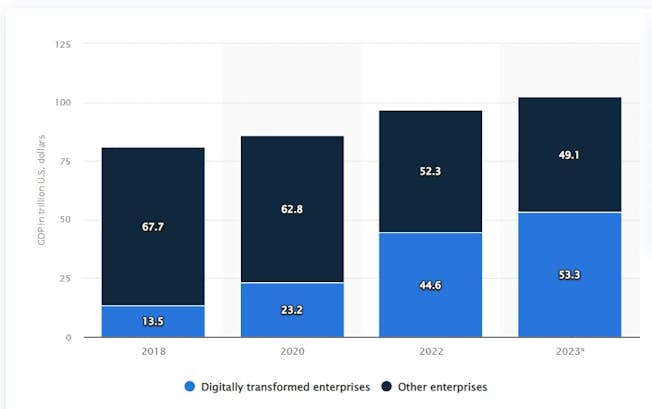About Us
- Dekwaneh - Roundabout - Alma Center - 6 & 7th Floor
- +961 1 692026
- [email protected]
- Week Days: M-F 8:00 Till 17:30
Digital Marketing In Lebanon, Professional Development
- Home
- 5 Ways to Upskill Your Marketing & Sales Teams

Many organizations struggle when it comes to digital transformation. Often that’s because they focus on the technology and tools required. But digital transformation is about a lot more than that.
It’s no longer enough to have the latest software or use new technology as part of your digital strategy. To truly transform your organization, you need to establish a digital mindset and have the key digital skills required to accelerate your transformation journey.
As the face (and revenue generator) of your business, the secret to becoming digitized lies in your marketing and sales teams. But do they have the knowledge and skills to take your company where you need to go?
Let’s look at five simple and effective ways you can upskill your marketing and sales teams to achieve digital supremacy.
What is digital transformation?
Let’s start with what is digital transformation? Put simply, digital transformation is when you use digital technologies to create new or modify existing business processes, culture, and customer experiences to meet changing business and market needs.
According to Statista, digitally transformed enterprises will account for over $53 trillion in 2023, up from $13.5 trillion in 2018. This figure demonstrates the need for businesses to be digitally savvy to compete in a marketplace that’s becoming more reliant on digitization.

The mistake that many organizations make in their digital transformation according to Brian Corish, Managing Director at Accenture Interactive in our recent webinar is that they make too many changes at once.
“If you think about digital transformation, the companies that are the best artists are those that pick a point in the customer journey and transform that. They pick one part that they know they can create competitive differentiation and double down and over-invest.”
So for your company, think about the most important area to focus on first and set realistic milestones that will help you reach organizational objectives. This could be improving the customer purchase experience, improving sales and marketing alignment or looking to improve in-house digital skills through a training program.
Check out our case studies if you’re looking for some great examples of digital transformation with global brands.
1) Identify your mindset and skills gap
Digital is not an add-on to your business, it’s now a requisite and that thinking needs to feed from the top-down. Your business needs leaders that understand the importance and impact of digital to create and cultivate a digital culture that’s embedded across the organization.
The key to achieving this is to understand what the current mindset is. Ask yourself:
- Are your employees worried about or scared to use digital technologies?
- Do teams know what digital technologies and processes are in place across the business?
- Do teams collaborate and share information using digital channels?
- Are your employees aware of the digital activities that take place across the business?
- Do employees understand and know the business targets and goals – KPIs, revenue, etc?
Taking time to figure out where your employees are in terms of their understanding of the business can help you put processes in place that enable transparency and information sharing so everyone is on the right page.
This mindset feeds into the skills in your business. Becoming digital doesn’t mean you need to use every channel and piece of technology on the market. It’s about choosing the right ones for your business.
But do you have someone that can help you do that? Do you have a digital strategy? Are you confident in using key digital channels to get your message out there? There are so many digital skills that can help your business, but you need to have a plan that’s tailored to your organization to drive digital transformation.
2) Cultivate cross-functional teams
There’s no point in your sales and marketing teams working in silos. They have to work together to ensure your company’s message is clear and consistent to engage prospects and convert leads.
Encouraging cross-collaboration takes all knowledge and skills into account. It allows the sharing of ideas to maximize the activities in your organization and enables employees to work with and experience new technologies. It also helps instill the same language and a common understanding of digital to enable future and cross-departmental thinking.
This not only empowers employees and provides new knowledge, but it encourages teams to think outside the areas they work in and offers ways for recruits to get to grips with the company.
For example, it could be beneficial for a new marketing member to sit in on the weekly sales meeting to learn the lingo and see the tactics used to drive conversions. Or for the sales team to review edits of a blog to understand the importance of SEO keywords in lead generation.
It’s about enabling marketing and sales alignment to drive growth and success.
3) Offer Continuous Professional Development
Companies that invest in the right experience for their people and prepare for the future, tend to outperform their competitors, delivering 19% more growth in revenue than competitors and 15% more profit according to MIT Management.
“These companies are also more innovative, better at cross-selling, and deliver a significantly better customer experience,” said Kristine Dery, a research scientist at the MIT Center for Information Systems Research.
To prepare your employees for the demands of the digital world, you need to future-proof their careers. Continuous Professional Development (CPD) schemes provide a way to offer relevant and up-to-date learning for a range of core and specialized skills.
There are great benefits of CPD to both your employee and organization and it doesn’t have to be complicated. Many specialist companies – DMI included – offer simple and effective ways to learn new skills and earn CPD points such as reading an ebook, completing a short course, or listening to a podcast.
Once you identify the skills gaps in your organization, you can tailor your in-house training and CPD programs and regularly update them to reflect the changes in the marketplace to keep skills current.
4) Develop a rewards scheme to incentivize learning
It can be difficult for your staff to fit in learning on top of all their other responsibilities. To encourage learning, it can be useful to create a system of incentives to motivate and reward. These can take many forms:
- Offer dedicated time for training – this gives employees dedicated time to switch off work and focus on learning. It could be on a weekly or monthly basis.
- Credit learners publicly – shout about employees that take the time to learn through your internal networks or at meetings.
- Spot awards – this rewards a ‘learner of the month’ for example with a voucher or company day off.
- Monetary bonus – a cash bonus or extra money in a paycheck on a quarterly or annual basis.
- Offer certifications – offering a recognized certification is a great way to validate learning that can be shared in the company and on social networks.
- Include gamification – If you have a learning management system, think about including badges or leaderboards to encourage healthy competition
Another way to incentivize learning is to develop a peer-to-peer scheme in which employees come together to share knowledge and skills. This can be done at all levels to ensure team leaders and members get the benefit of each other’s know-how.
5) Provide relevant training and functional learning
It may seem obvious to offer relevant training, but a lot of organizations are still not doing it properly. You may have a learning management system in place, but is it up-to-date with today’s skill needs? Does it reflect the external world in terms of knowledge?
When you look at the skills required in the business, map that to the training you offer. So if you need a social media specialist, offer training in that area so other team members can be up to speed.
It’s also crucial to offer training that lends itself to functional learning and ensure your staff are ‘job ready’. In essence, you need your workforce to have skills that are instantly applicable and relevant across business areas so they can carry out specific digital functions.
One of the challenges with digital, whether it’s digital marketing or achieving social selling success is that it changes all the time. This means that skills can go out of date quickly and new things – software, social apps, algorithms – need to be learned to keep up.
Conclusion: Future proof your business & employees
As you can see there are many ways to get your digital skills up to speed to keep up with digitization. It’s about understanding your business and employees so you can create personalized and valuable experiences that cultivate careers.
Your marketing and sales teams are valuable assets and need to be nurtured to ensure performance and retention. After all, it’s a competitive employee market out there. It’s easier to train the staff you already have in the skills they need than to continuously hire new ones.
#DigitalMarketingInLebanon #LocalSEOmarketinginLebanon #Contentmarketingstrategy #SocialmediamanagementinQatar #SocialmediaengagementinLebanon #SMSmarketingintegrationinLebanon

